Karachi, June 16, 2025 – The benchmark KSE-100 index of the Pakistan Stock Exchange (PSX) edged higher on Monday, reflecting cautious optimism amid signs of global market stabilization.
Investor sentiment showed mild improvement after a volatile previous week that saw markets reel from heightened global geopolitical tensions.
The KSE-100 index recorded a modest gain of 82 points, closing at 122,225 points, compared to Friday’s finish of 122,143 points. This upward movement, though marginal at 0.07%, marked a shift in momentum, following last week’s steep declines triggered by Israel’s attack on Iran — an event that shook global financial and commodity markets.
According to analysts at Topline Securities, the index experienced a pullback session largely influenced by a rebound in global equity markets. During the session, the KSE-100 index moved within a tight range, registering an intraday high of 759 points and a low of 253 points, indicating persistent investor caution.
Positive contributors to the index included BAHL, OGDC, NBP, MARI, and MEBL, which collectively added 371 points. However, this was partially offset by selling pressure in heavyweight stocks such as ENGROH, PKGP, and LUCK, which together shaved off 255 points from the index’s total gains.
Market activity remained robust, with the total traded volume reaching 1.22 billion shares and the total traded value recorded at PKR 25 billion. WorldCall Telecom (WTL) led the volume charts with an impressive 267 million shares traded, showing continued interest from retail investors.
Despite the modest advance, market participants remain vigilant amid persistent global uncertainty, particularly in the Middle East and fluctuating commodity prices. Analysts suggest that the KSE-100 index may remain sensitive to any further global shocks in the short term, although improving sentiment in international markets could help stabilize the index moving forward.
As global developments continue to influence local investor behavior, the performance of the KSE-100 index will likely mirror broader economic and geopolitical trends shaping financial markets worldwide.
